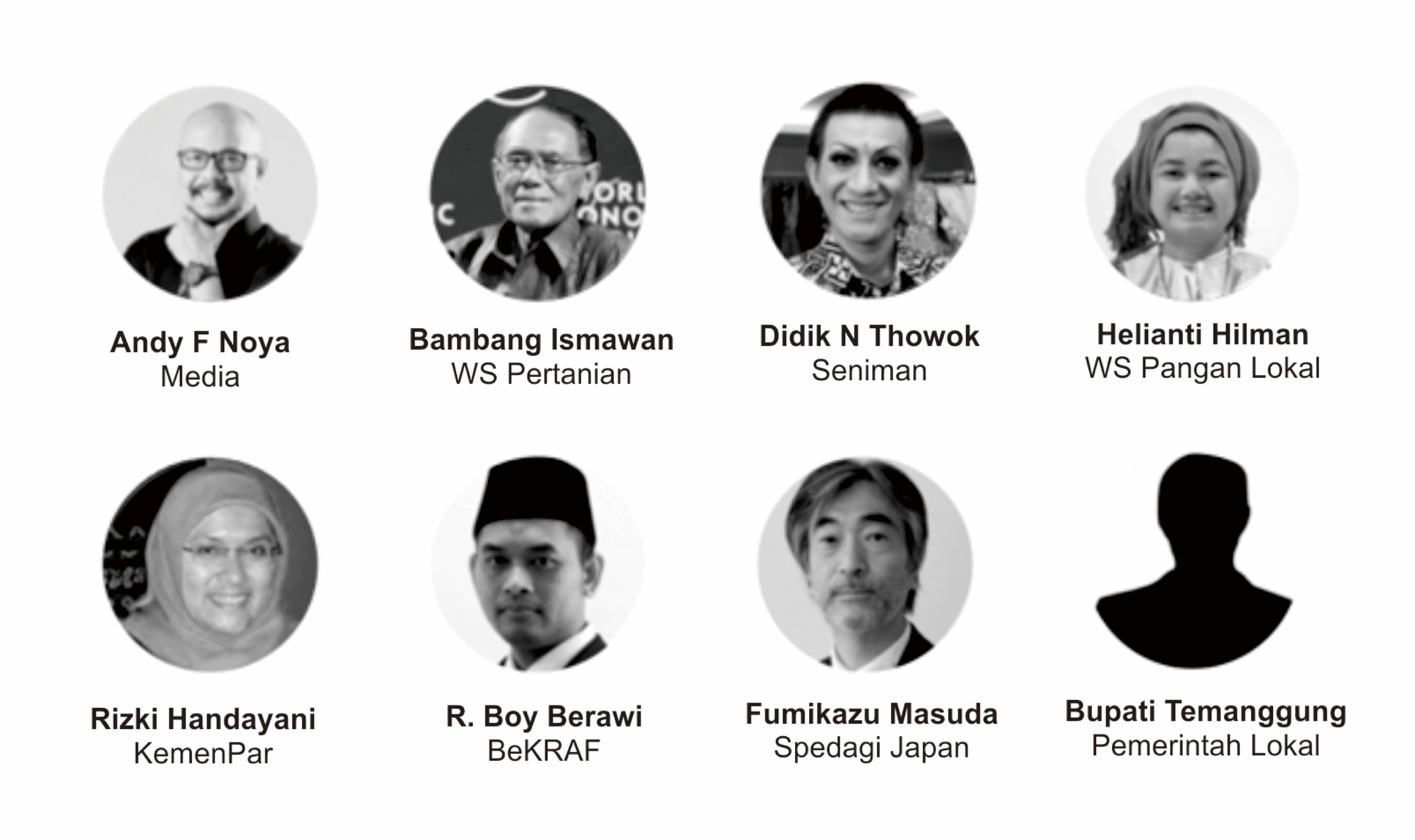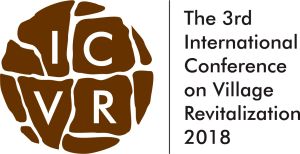
ICVR# will be held in Ngadiprono and Ngadidono Hamlets, Ngadimulyo Village, Kedu, Temanggung Regency, Central Java Province, Indonesia. This activity will run on November 22nd-25th 2018. This location was chosen because this is the location of Pasar Papringan, a project of bamboo forest conservation through creative approach. Pasar Papringan was started as a Pre-Conference Project of ICVR#2 which then became the locomotors of other village revitalization projects in a wider area. In this area, will be hold several other projects of Pre-Conference Projects related to ICVR#3 event. The conference venue will utilize the shady and beautiful area of Pasar Papringan. When the market does not open, this area becomes a public space. The full program participants will stay in home stays which are integrated to the local residents’ homes, which is also one of the Pre-Conference Project of ICVR#3.


ICVR#3 will bring a special theme which is COOLABORATION. This word comes from a coined-word “Cool” and “Collaboration”, which means cool collaboration. Collaboration is a basic prerequisite to run village revitalization programs successfully. Collaboration also provides opportunities for synergy between parties.
All parties are expected to be involved since the initiation process, starting from the introduction and problem formulation, program planning, up to the realization of the activity. The woven bamboo that serves as the symbol of COOLABORATION is the analogy of the strong building structure resulted from the mutually reinforcing fabrication formed through the precise sequence of processes.

Programs Of ICVR#3

Seminar
In the seminar, both local and international speakers will present a talk about Village Revitalization. The background of the speakers are from government, community, NGOs, academics and private sectors.
Workshop
In the ICVR#3 activities, there will be 2 workshops under the theme of Contextual Education and Rural Information Technology. The training for participants will be directly assisted by the experts.

Excursion
Participants will be invited to field studies by gathering information and witnessing the practice of Pre-Conference Projects (PPK) for direct revitalization of the village. Participant will listen to the projects development directly from the movers involved. On the last day, participant will visit Pasar Papringan market.
Exhibition
The exhibition will contain a series of the development of village revitalization projects initiated by Spedagi and Pre-Conference Project of ICVR#3 (PPK). In addition, there will be a dancing art performance of Sendratari Tambujatra which is also one of the PPK.
Programs Of ICVR#3

Seminar
In the seminar, both local and international speakers will present a talk about Village Revitalization. The background of the speakers are from government, community, NGOs, academics and private sectors.
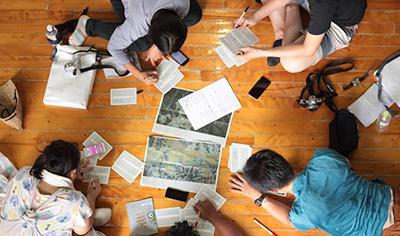
Workshop
In the ICVR#3 activities, there will be 2 workshops under the theme of Contextual Education and Rural Information Technology. The training for participants will be directly assisted by the experts.

Excursion
Participants will be invited to field studies by gathering information and witnessing the practice of Pre-Conference Projects (PPK) for direct revitalization of the village. Participant will listen to the projects development directly from the movers involved. On the last day, participant will visit Pasar Papringan market.
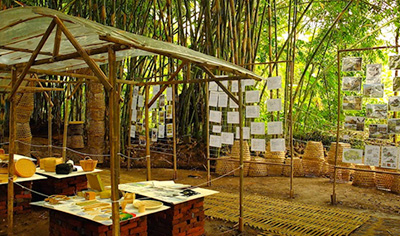
Exhibition
The exhibition will contain a series of the development of village revitalization projects initiated by Spedagi and Pre-Conference Project of ICVR#3 (PPK). In addition, there will be a dancing art performance of Sendratari Tambujatra which is also one of the PPK.

Pre-Conference Project (PPK)


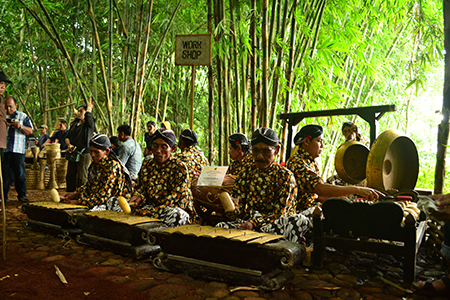
The Pre-Conference Project (PPK) is a village-themed projects prior to the implementation of ICVR as an attempt to test, realize the ideas, thoughts and concepts of Village Revitalization located in rural areas and elsewhere, both home and abroad. A number of good PPKs are expected to be real activities that continue even after the ICVR ends. In ICVR#3, PPK will consist of the revitalization project of Ngadidono and Ngadiprono Hamlets areas.
PPK Ngadiprono-Ngadidono is a continuation of the Pasar Papringan Market which later turned out to have the potential to be a locomotive of change in the two sub-villages. Meanwhile, PPK International is planned to be held in two countries, namely developed/industrial countries and developing countries, where the two are interconnected. Through this project, it is expected to obtain a model of Village Revitalization program where both developed and developing countries able to enter the Post-Industrial Era simultaneously.
Pre-Conference Project (PPK) Ngadiprono-Ngadidono
Tambujatra is an acronym of the Taman Bambu Jalan Trasah (Garden Bamboo Stone Path), a name that represents activities that combine the beauty of bamboo gardens and stone paths. The beauty of bamboo garden landscape design Papringan market has become a magnet outside the market itself. Tambujatra is expected to become a new public space through the cultivation of a good collaborative landscape design.
The initiation of the Papringan Market and the planned ICVR#3 in Ngadiprono sparked the idea of providing lodging facilities (home stay). Home stay development is expected to be one of the ways to improve the quality of shelter and environment of local communities, as well as the aspects of socio-cultural life, environment, customs, architecture, village spatial planning, and so on.
The community of Ngadidono Hamlet, a neighboring hamlet which directly adjacent to Ngadiprono Hamlet has proven a potential of good art. Starting from these potentials, we initiated a scheduled local-based, internationally-qualified dancing art performance to attract visitors from outside the village, even from out of town into Ngadidono Hamlet.
Explore
TAMBUJATRA
Homestay
TAMBUJATRA
Sendratari
TAMBUJATRA
Who Are The Participants Of ICVR#3?

*tanggal 25 November adalah hari gelaran Pasar Papringan, bagi peserta yang ingin mengunjunginya Panitia akan memberikan informasi kontak dan alamat hotel di Kota Temanggung agar peserta bisa melakukan pemesanan sendiri.
Who are the Speakers Of ICVR3?
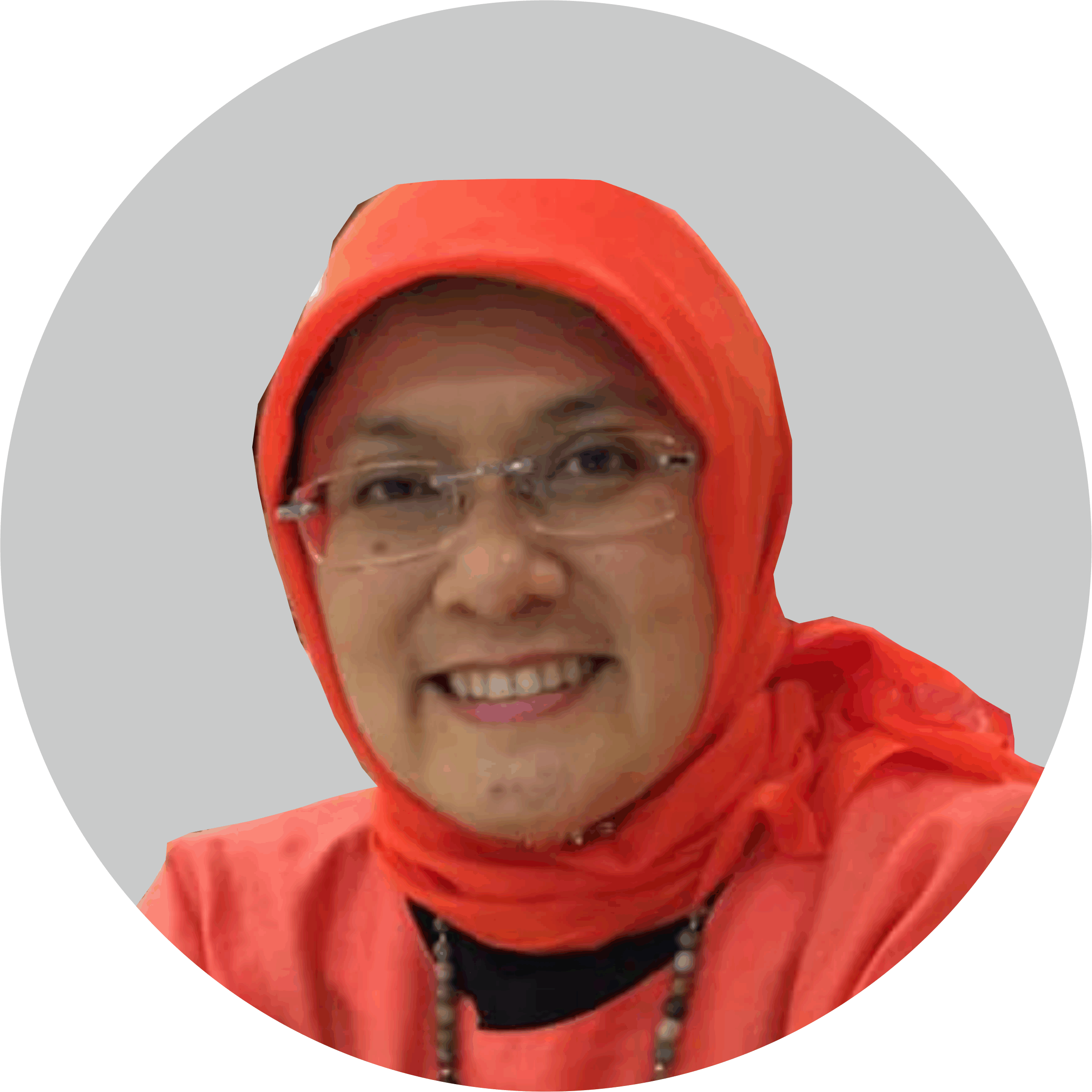
RIZKI HANDAYANI M
Deputy of Industry and Institutional Relations Ministry of Tourism of the Republic of Indonesia
W : kemenpar.go.id
FB : rizki.handayanimustafa
The woman who is familiarly called ‘Kiki’ was born in Palembang, 52 years ago. Kiki is a graduate of Bandung Institute of Technology’s Planning Engineering and she continued her study in Tourism Management at Victoria University, Australia. Prior to her position as Deputy for Industrial and Institutional Development at the Ministry of Tourism of the Republic of Indonesia, she served as the Deputy Assistant of Southeast Asian Market Development at the same ministry. In early 2018, Kiki and a group of staff from the Ministry of Tourism of the Republic of Indonesia chose the location of Spedagi’s Papringan Market in Ngadiprono, Temanggung, as the venue for their activities. Kiki argues that learning from the village provides an enlightenment for soul, ratio, and body. In the discussion, Kiki also had the opportunity to have a dialogue directly with the village revitalization activists from Spedagi. She is committed to facilitate the community to develop themselves in the field of tourism and support the activities of regional development in rural areas, one of which is the activities of ICVR #3. The meeting continued the collaboration between Spedagi and the Ministry of Tourism of the Republic of Indonesia.

DR. MITSUHIRO TOKUDA
Senior Architect, PhD Design; Associate Professor Kyushu Institute of Technology – Japan
FB : mitsuhiro.tokuda.7
Tokuda is a professor of architecture at the Kyushu Institute of Technology, Japan, who engaged in the town revitalization by stimulating the building, as a first step to stimulate the neighborhood. He launch the study of downtown Kitakyushu to quantify how much of the city had become vacant by identify which buildings were partially or completely vacant and which could be reused, then started a small business to work with property owners to renovate vacant spaces for new uses. Tokuda and his team converted it into a hodgepodge of new spaces – a community room, small offices, creative work spaces for local craftspeople, a cafe, and boutiques. In order to teach others to try it himself, in 2011 he launched what he calls a Renovation School in which students – architects, designers and businesspeople, mostly – develop business plans for reusing vacant space. Renovation Schools have now been conducted in cities across Japan, creating new retail spaces from previously vacant buildings. He believes that this approach to reusing space can be a kind of catalyst for change with multi-stakeholder synergies among government-citizen-consultants.

ANNA GUEGAN RAHMAH
Lorrina Community,
Tasmania, Australia
W : earthynest.net
Australian born Anna Guegan Rahmah (Liana) has a BA Honours in Social Anthropology and has worked in a number of culturally diverse areas around Australia. Liana currently works as a consultant writer for a community development project in Kiribati. Her husband is from West Java, and the family make annual trips to Indonesia to visit family and to develop a sustainability project on their southern hinterland property. In Australia, Liana lives in a remote village focused on sustainable living and strong community called Lorinna. Lorinna is a tiny, non-intentional community nestled in the northern mountainscapes of Tasmania, Australia. The community is remote and off the grid, and as such tends to attract a demographic of alternative professionals looking to raise their families in sustainable circumstance. At the end of 2017, Liana and her family visited Spedagi. They shared stories about Lorrina and the activities running by their community.
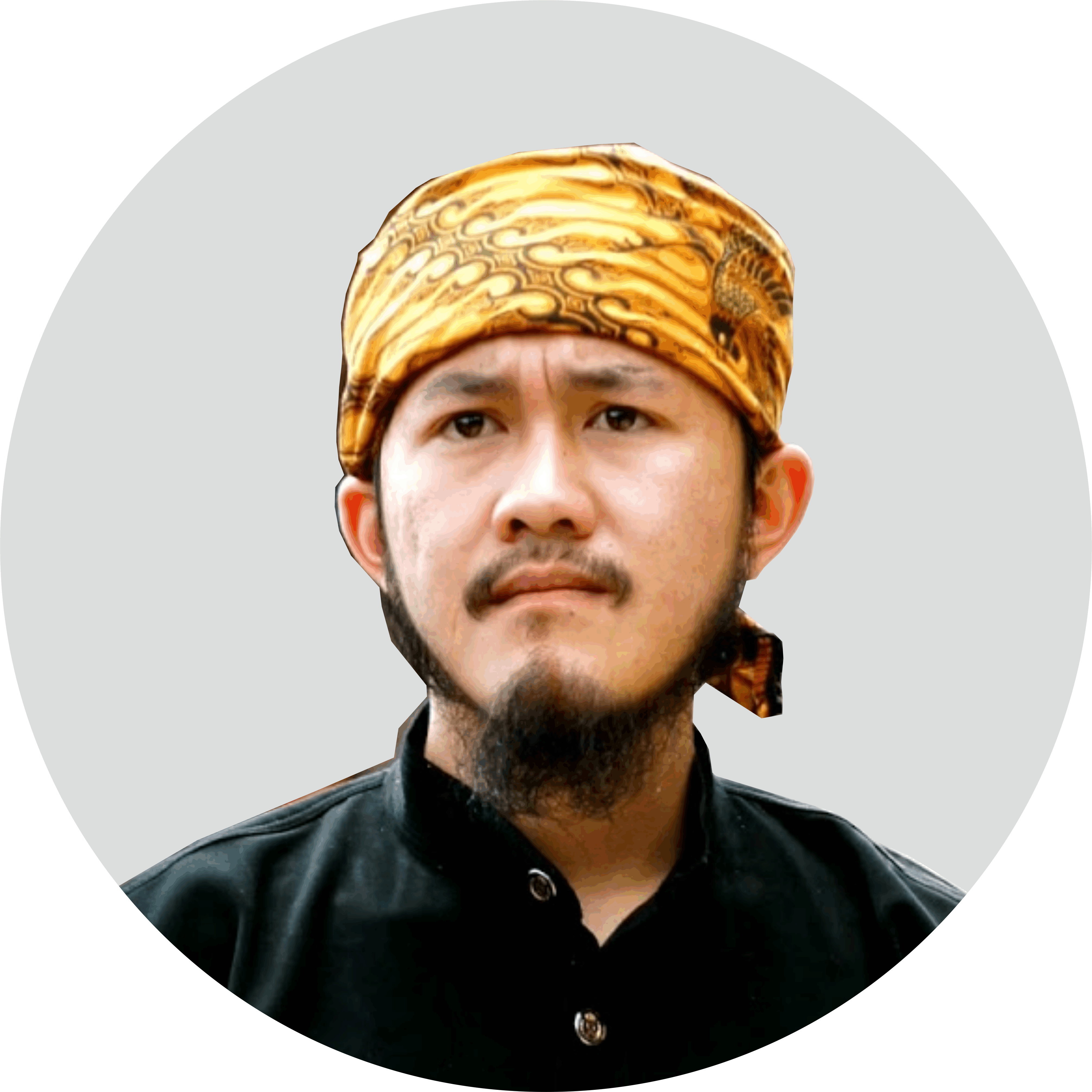
UGI SUGRIANA RAKASIWI
Chief of Ciptagelar Village,
Sukabumi, Jawa Barat, Indonesia
W : ciptagelar.info
FB : Kasepuhan-Ciptagelar
Stay away from the hustle and bustle of city life in a fairly isolated and remote place doesn’t mean they are also apart from technology. Abah Anom Ugi Sugriana Rakasiwi is known as the Sesepuh Girang (chief) of Ciptagelar Village, Cisolok District, Sukabumi Regency, West Java, as well as one who introduce the modernization to the village. He brought the traditional side closer to the development of the world. Although Kasepuhan Ciptagelar society still holds the tradition, in general they are an open society. They never intended to see themselves as tourism objects. The tradition is run not to attract tourists, but purely as the actualization of a civilized man. Thanks to the skilled hands of Abah Ugi, the traditional-looking landscape of Ciptagelar Village became phenomenal when it came to be known that the village had its own television and radio stations. Television and radio programs are hosted by local people who generally contain education or announcements for certain activities. Abah Ugi introduces the latest technology to the people of his village without leaving the culture and tradition.

UDI HARTOKO
Head of Pujon Kidul Village,
Malang, Jawa Timur, Indonesia
W : sie.pujonkidul.desa.id
FB : Dewi Pujon Kidul
Villagers of Pujon Kidul Village, Pujon Sub-district, Malang Regency, East Java, attempted to break the village stigma that is identified with poverty, underdevelopment, and slums. Udi Hartoko, who has been the head of Pujon Kidul Village since 2011, is the driving force of change in the village. He and his entire village community are able to transform the backward village into a unique and interesting tourist destination village by integrating the village potencies. He develops his village by explorating the potential of nature, economy, and culture and packing it very well as an educative tour for visitors. Community awareness and institutional reform of the village became the key to Udi Hartoko’s success in developing his village. He believes that the public’s trust to their village government must be obtained before starting the development process. The success of Pujon Kidul Village in utilizing Village Fund (from the state) well as possible for the benefit of the community also received the attention of many people so that it becomes a pilot village in village management, village sanitation, and community empowerment.

UKKE R KOSASIH
Founder of Circa Handmade,
Bandung, Jawa Barat, Indonesia
IG : @circahandmade
FB : Circa-HandMade
She is graduated from Department of Anthropology, University of Indonesia, and former Manager of Social and Environmental Affairs of The Body Shop Indonesia. Inspired by The Body Shop founder, the late Anita Roddick, known for her devotion to social issues, Ukke founded Circa Handmade in 2006 in Cihanjuang, Bandung. She believes that lack of education may have an impact on inadequate job opportunities and low self-esteem. The journey of Circa Handmade begins with the formation of communities that promote the empowerment of community-based women to make them confident and build their self-esteem. From the process that was initiated in the Circa community, the idea of ’Craft for Change’ was born, a community-based women empowerment program aimed in making changes through productive creation with the spirit of sharing that was done collectively. With Circa’s experience, Ukke wants to create a women’s empowering business model that can be implemented by anyone, anywhere, and in any field. According to her admission, Ukke is one of the ‘victims’ of the Spedagi campaign to go back and work in the village.

DICKY SENDA
Founder of Lakoat Kujawas, Mollo,
NTT, Indonesia
w : lakoatkujawas.blogspot.com
FB : dicky.christian.senda
IG : @dicky.senda
Dicky Senda is a graduate from Faculty of Psychology, University of Mercu Buana, Jogjakarta. He is known as the initiator of Lakoat.Kujawas, a project of social entrepreneurship in the field of art and culture. Initially he intended to go to his hometown to focus on researching and writing a novel, but in the middle of his journey he found many things beyond what he thinks. He met some of native language speakers in Mollo who is already old. Then he thought, if there is no documentation or archiving, there will be no young people who want to learn and become the successor, so that in the near future villagers will lose a lot of important information. He finally found that the concept of social entrepreneurship can be one of the solution. Together with his friends, Dicky designed Lakoat.Kujawas as a co-working space, where Mollo’s youth could gather, discuss, and work with other Mollo fellow or people from outside Mollo. Lakoat.Kujawas, a youth community in Taiftob Village, East Nusa Tenggara, integrates social entrepreneurship with community libraries, collaborative workspaces, art communities, archives, and homestays.

BURHAN UD DIN KHATEEB
Founder of Kashmir Innovation Lab (KILAB)
Kashmir, India
FB : burhanuddin.khateeb
IG : @Burhan_ud_din-khateeb
Burhan Ud Din Khateeb has become the first student from the Jammu & Kashmir state to graduate from National Institute of Design (NID), Ahmedabad, India. He completed his graduation project on ‘Repositioning traditional exploration in paper machie craft of Kashmir’, a study, which he conducted in collaboration with the Craft Development Institute of J&K. He is an independent product designer who picked up the traditional craft, and is using technology, to reinvent it and create functional objects. After graduating from NID in 2016, he decided to do internship at Spedagi for 3 months. He has been working in diverse crafts sector since then and finding ways to build creative capacity in the state to address the immense socio economic challenges that the state is facing. For this purpose he has started Kashmir Innovation Lab, a multidisciplinary design studio which acts as a platform for creative activity and collaborations between multiple parties.

LAVINIA ELYSIA
Spedagi Japan International Relation Manager
W : spedagijapan.com
FB : spedagijapan
IG : @spedagijapan
Lavinia Elysia was born 1993 in Surabaya, Indonesia. She was graduated from Interior Design Department of Petra Christian University, Surabaya, in 2015. During her university years, she was a design intern in IBUKU (PT Bamboo Pure) Bali and volunteering for Pasar Papringan, a bamboo forest revitalization project by Spedagi in Temanggung, Central Java. Her thesis was a design research on municipal solid waste management, which is now being developed into an online educational platform namely Trash for Good. After graduation, she worked as an interior design lecturer in Petra Christian University, a design intern in open house inc. Japan and volunteer of International Conference of Design for Sustainability. She had been doing social design research and activities on haiko, abandoned buildings in Japan due to the phenomenon of aging society and decreasing population. She wrote a bilingual book entitled Haiko Nia’s Suggestion, published in Japan in 2017. Since 2018 she has been working as a designer and international affairs manager of Spedagi Japan inc. in Yamaguchi, Japan.

YULI KUSWORO
Director ArKomJogja,
Yogyakarta Indonesia
W : arkomjogja.or.id
FB : arkomjogja2016
IG : @arkomjogja
Yuli Kusworo is an architect who was graduated from Architecture Department, Duta Wacana Christian University, Yogyakarta, who is doing post graduate work in Disaster Management, Gadjah Mada University, Yogyakarta. He has been working for 2 years in a large reconstruction project when tsunami struck Indonesia in 2004. In 2006, he was involved in other reconstruction project after powerful earthquake rattled Yogyakarta, his home city. After these 2 big projects were completed, several architects and community organizers felt that their experience working with communities should be consolidated and shared to other people and communities. With that decision, Arkomjogja was established in 2008, focusing on the participatory approach, community organizing, and concern for adequate living space. Yuli is present coordinator and one of the founding members of Arkomjogja. Yuli’s work has taken him to multiple projects all over Indonesia that promote sustainable housing while respecting local traditions and traditional architecture. He also lectures on the promotion of community development, post-disaster architecture and participatory planning and design in several universities in Indonesia.

IMAM ABDUL ROFIQ
Pasar Papringan Ngadiprono Local Initiator, Ngadimulyo, Kedu,
Central Java, Indonesia
FB : PasarPapringan
IG : @pasarpapringan
Being born in a village in Temanggung Regency, Indonesia, makes him very close to the culture of the village community. He is a graduate of Sebelas Maret University, Surakarta, Department of Indonesian Literature. His concern for the condition of the village forcing him to think what can he do to make a change from his immediate environment. In November 2016, along with the young people of Ngadiprono Hamlet, Ngadimulyo Village, he founded Mata Air Ngadiprono Community, a community that aims to create a smart, independent village community, that is capable in managing the existing resources on the principle of benefit without neglecting the values of environmental conservation. In the end of 2016, Mata Air Ngadiprono Community collaborated with Spedagi to establish Pasar Papringan (Papringan Market) Spedagi in Ngadiprono, a bamboo grove conservation effort through creative approach by raising local wisdoms of the local community. Through the Papringan Market, bamboo gardens that previously used as garbage dumps transformed into a new public space, as well as economic, social, and cultural space. He believes that its true village is the center of world civilization.

SUGENG RIYADI
Staff in Cultural Department
Culture and Tourism Department
Temanggung, Central Java, Indonesia
FB : sugeng.riyadi.940098
Born in one of remote village in Wonogiri 38 years ago, does not necessarily make Sugeng familiar with karawitan music (javanese traditional music). Like most teenagers, Sugeng’s adolescence is also filled with the story of joining a band, and continued to be acquainted with the keroncong music that brought him into the world of campursari (javanese contemporary music). Over time, his friends in the campursari group suggested Sugeng to continue his studies at Indonesian College for the Arts (STSI – now ISI Solo). New things in ISI solo open his mind to the richness of karawitan musical. Los and Rasamaya music group brought Sugeng acquainted with the musical composition. With a variety of musical backgrounds, through this group Sugeng began to build collaborations across musical genres. As a musician he has participated in the Young Composers Week 2007, Choreographers and Young Composers Competition in Bali, Yogyakarta Gamelan Festival, etc. Currently Sugeng works at the Department of Tourism & Culture of Temanggung Regency and becomes one of the core committee in the pre-conference project of Sendratari Tambujatra (Tambujatra Performing Arts) ICVR#3.
Who are organizing the ICVR3?
The committee of ICVR#3 becomes a joint committee with the younger generation, where stakeholder representatives hold a role in it.
Organizing Committee


Fransisca Callista
Ketua

Tara Sutrisno
Penggalangan Dana

N. Meida R.
Acara

Partini
Sekretaris

Tri Wahjuni
Bendahara

Lavinia Elysia
Hubungan Internasional

Yudo Nugroho
Publikasi
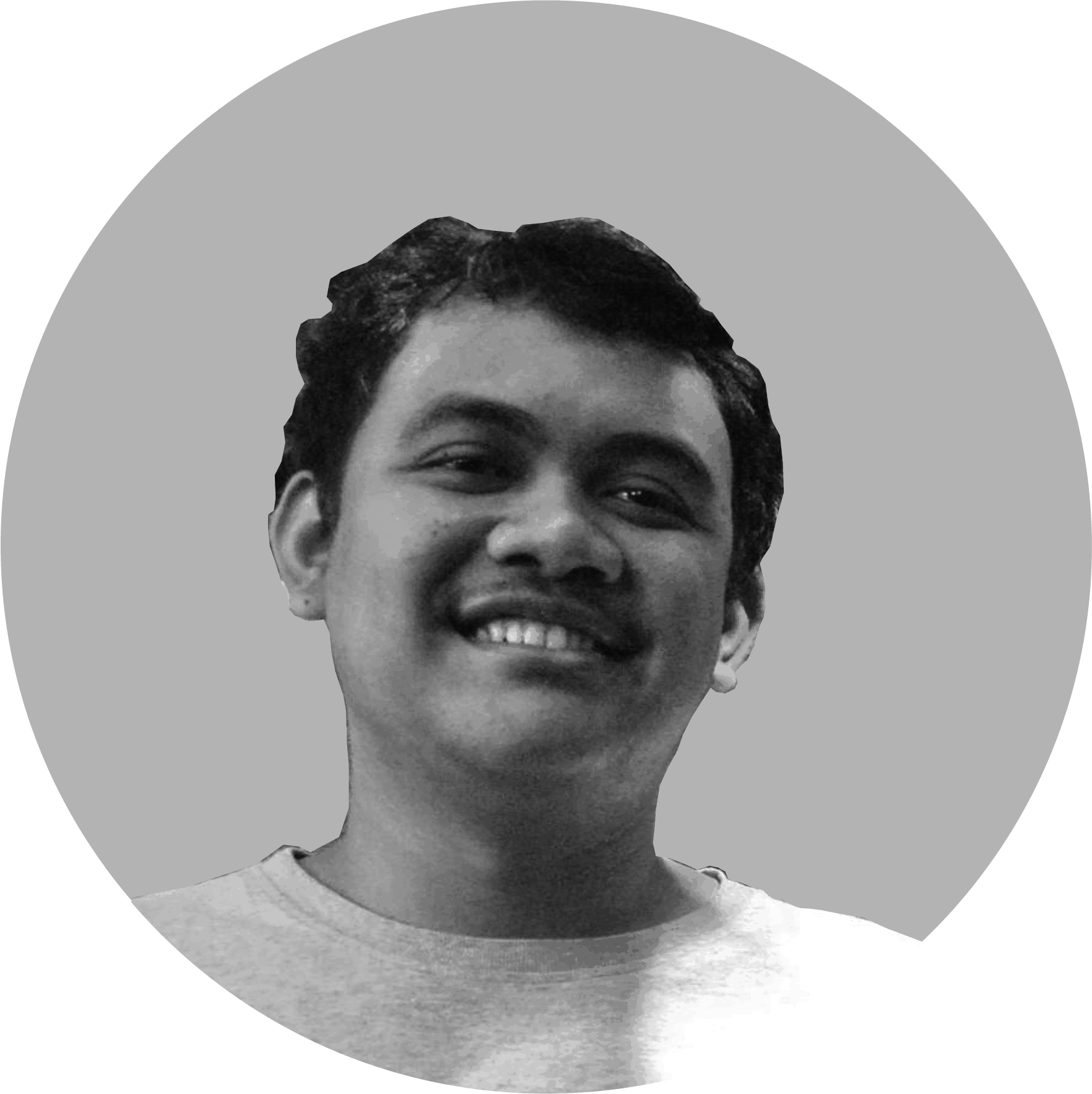
Luhur Setyo P.
Dokumentasi

Yudhi Setyawan
Artistik, Konsumsi

Imam A. Rofiq
Proyek Pra Konfrensi

Pratama Panji P.
Proyek Pra Konfrensi

Sugeng Riyadi
Proyek Pra Konfrensi
Steering Committee

Board of Advisor
